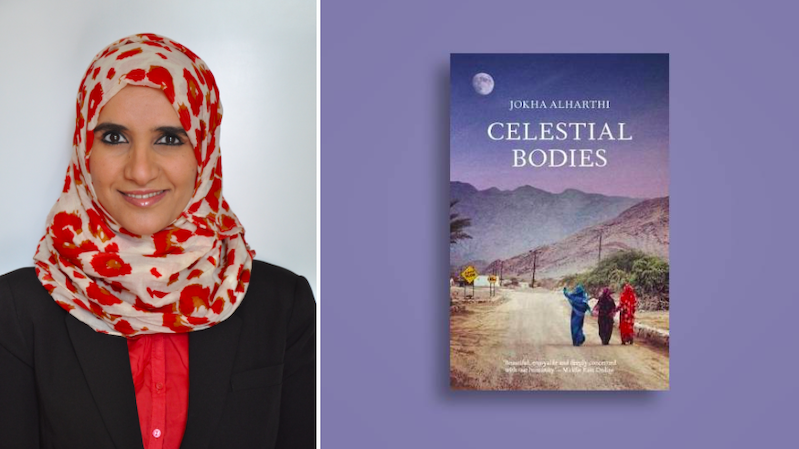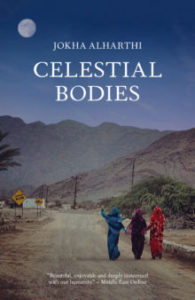
Just minutes ago in a ceremony at London’s Roundhouse, Celestial Bodies, written by Jokha Alharthi and translated by Marilyn Booth, was announced as the winner of the 2019 Man Booker International Prize. The win makes Alharthi the first Arabic author to win the award and the the first Omani woman to have a novel translated in to English.
Celestial Bodies is a story of a nation coming of age, set in the village of al-Awafi in Oman, where we encounter three sisters: Mayya, who marries Abdallah after a heartbreak; Asma, who marries from a sense of duty; and Khawla who rejects all offers while waiting for her beloved, who has emigrated to Canada. These three women and their families witness Oman evolve from a traditional, slave-owning society slowly redefining itself after the colonial era, to the crossroads of its complex present.
Bethany Hughes, the chair of this year’s judges’ panel, called the Celestial Bodies “a book to win over the heart and head in equal measure, worth lingering over. Interweaving voices and timelines are beautifully served by the pacing of the novel. Its delicate artistry draws us into a richly imagined community.”
First introduced in 2005 as a complement to the Man Booker Prize, the Man Booker International Prize—which celebrates the finest books in translation from around the world—is given annually to a single book in English translation (having previously been awarded every two years to a living author of any nationality for a body of work published in English or generally available in English translation), with a whopping £50,000 prize for the winning title, shared equally between author and translator.
Congratulations to Alharthi, Booth, and to all the finalists!
*
Winner:
Celestial Bodies by Jokha Alharthi, Trans. by Marilyn Booth

“…a densely woven, deeply imagined tour de force that follows Omani families between the 1880s and the early years of the 21st century … While the novel is historical fiction, it does not follow an easy trajectory from ‘tradition to modernity’ or ‘local to global.’ The book scorns romanticised history and happily-ever-afters. Individual characters are often taunted when they use romance as a way of understanding the world…Celestial Bodies never actually gets to the “ever after”. Instead, it continually re-evaluates both present and past. And while the book doesn’t tell us how things turn out, it skilfully builds suspense by creating “Aha!” moments as characters come to better understand their pasts … The translation does not coddle the reader who may be afraid of foreign words. Booth embroiders the text with the sound of Arabic wherever possible, maintaining rhythm and even rhyme, as well as the crackle and pop of the book’s humour. Celestial Bodies is not a straightforward book, but readers who can leap nimbly into its stream will certainly find themselves carried away.”
–Marcia Lynx Qualey (The National Arts & Culture)
Finalists:
Drive Your Plow Over the Bones of the Dead by Olga Tokarczuk, Trans. by Antonia Lloyd-Jones
The Years by Annie Ernaux, Trans. by Alison L. Strayer
The Shape of the Ruins by Juan Gabriel Vásquez, Trans. by Anne McClean
The Remainder by Alia Trabucco Zerán, Trans. by Sophie Hughes
The Pine Islands by Marion Poschmann, Trans. by Jen Calleja
If you buy books linked on our site, Lit Hub may earn a commission from Bookshop.org, whose fees support independent bookstores.

